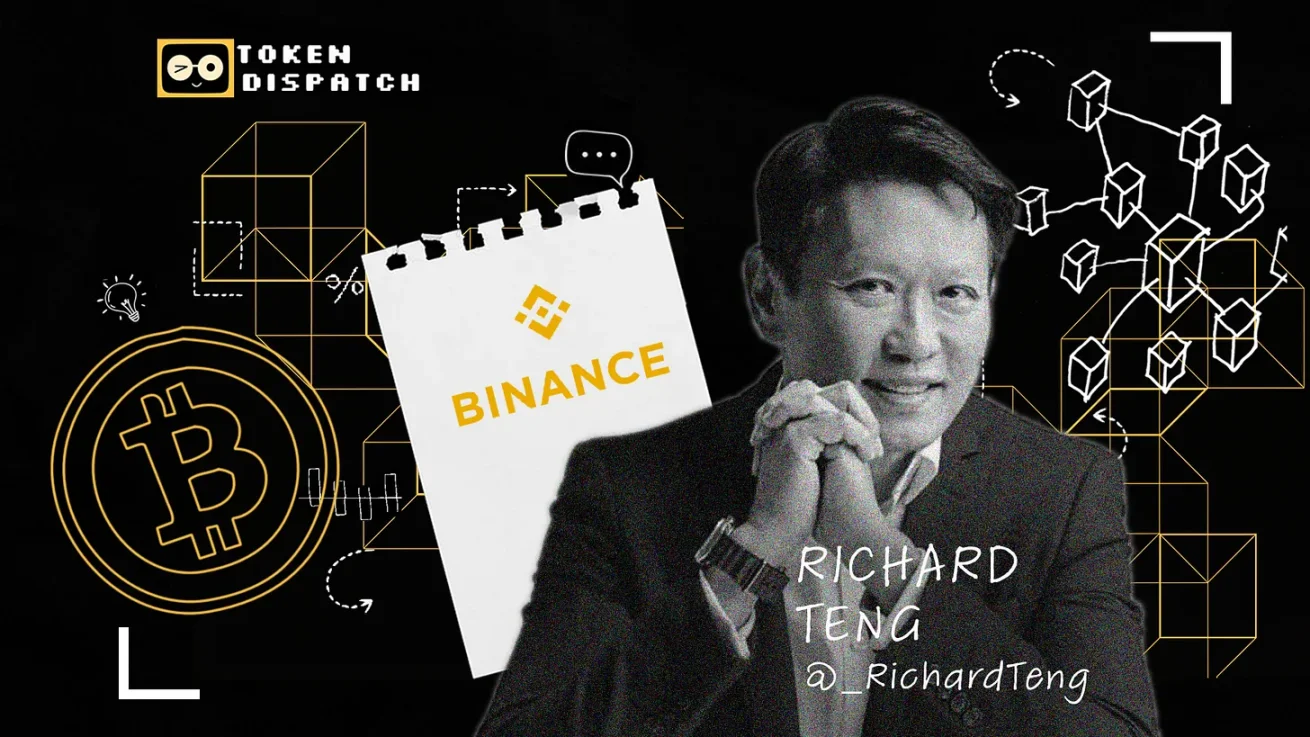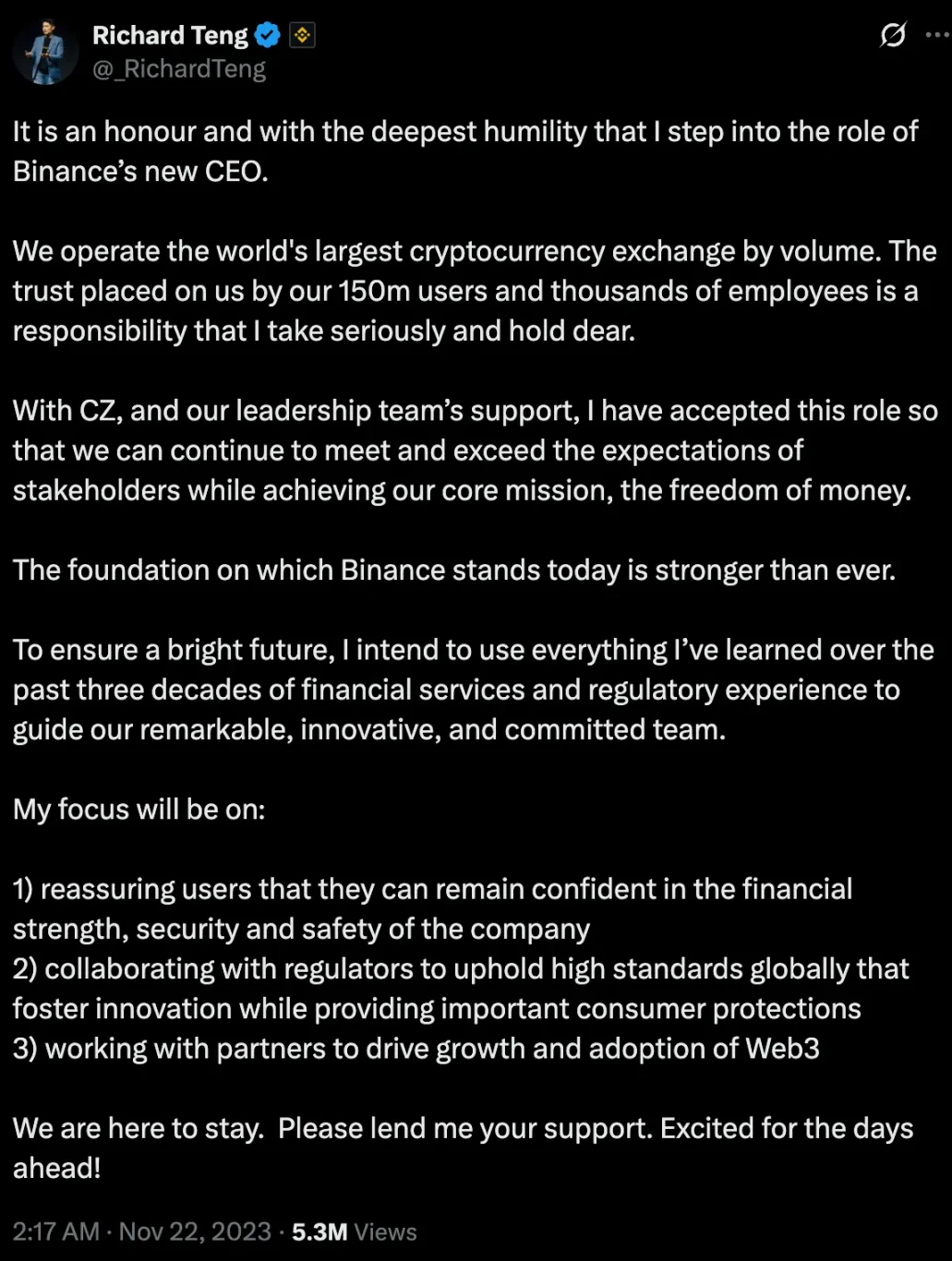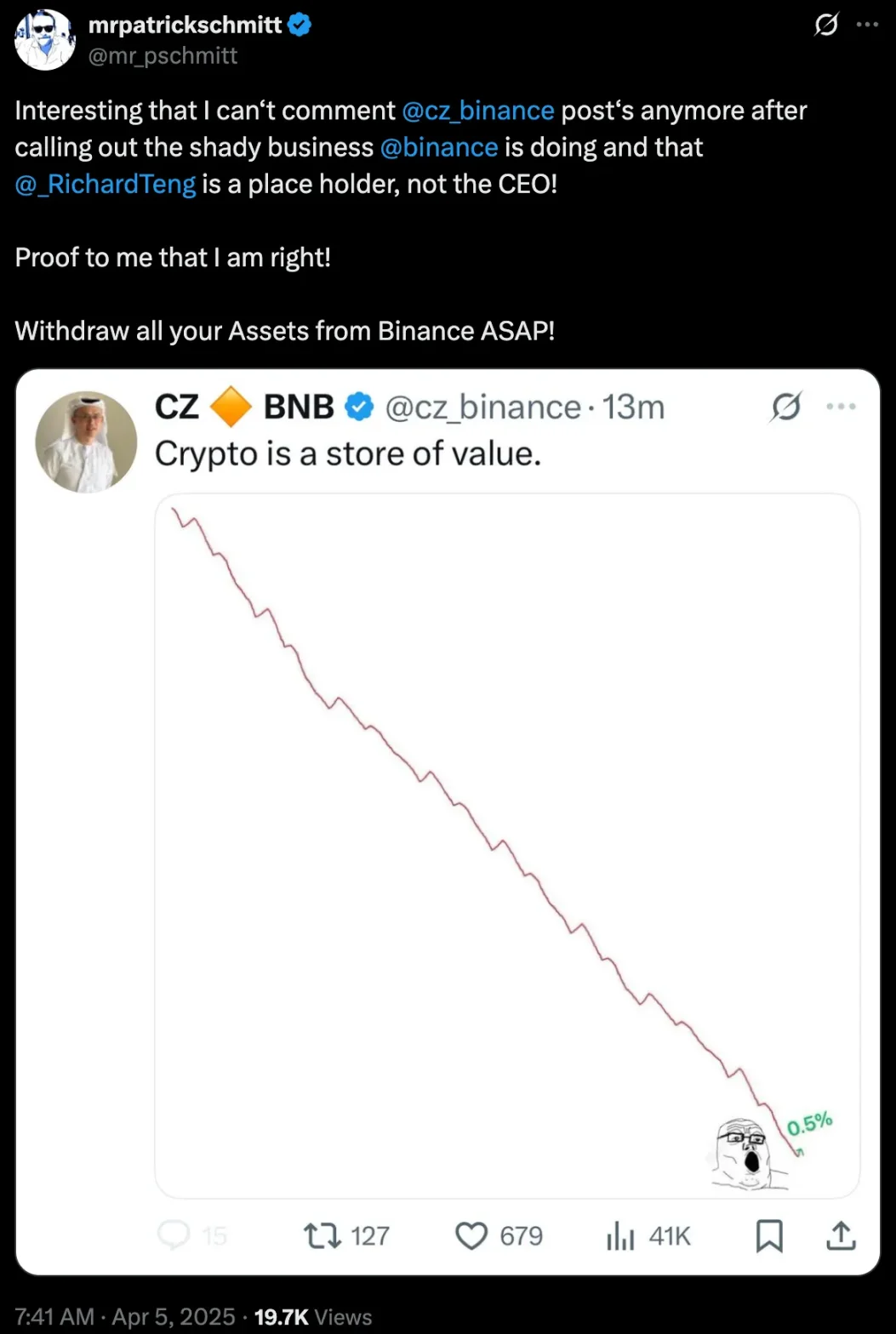Written by: Thejaswini M A
Translated by: Luffy, Foresight News
A notification on cryptocurrency Twitter (X platform) has sparked heated discussions: Zhao Changpeng (CZ) has removed the label "former Binance" from his profile.
Prediction markets have begun speculating on the likelihood of him receiving a presidential pardon from Trump, and my X platform timeline is filled with speculation about the founder's imminent return. Everyone is discussing whether Zhao Changpeng will regain control of the world's largest cryptocurrency exchange.
However, while the entire internet is focused on the "digital breadcrumbs" left by Zhao Changpeng, one person has been quietly steering Binance through its most perilous period in history.
Now, let us tell his story.
Richard Teng has quietly transformed Binance from a "compliance nightmare" into one of the most well-regulated cryptocurrency exchanges. He took over during the company's darkest hour: facing a $4.3 billion fine, the wrath of regulators, and fundamental questions about survival. Eighteen months later, Binance's user numbers, the number of licenses held, and the number of institutional partners have all reached historic highs.
The 52-year-old former regulator insists that he is focused on the future rather than the past. But his position is far more precarious than it appears: the choices he has made to push Binance towards compliance and "orthodoxy" may have caused the exchange to lose its original revolutionary characteristics.

Richard Teng's cryptocurrency journey began at a highly formal institution: the Singapore Government Office. In 1994, he graduated with honors from Nanyang Technological University with a degree in accounting, and then served as a regulator at the Monetary Authority of Singapore (MAS) for 13 years.
Teng comes from humble beginnings; his mother worked in a nursing home, and details about his father are not publicly available. This government job provided him with a sense of security and prestige that his family background could not offer.
During his time at the Monetary Authority of Singapore, Teng gained a deep understanding of the mechanisms of financial regulation. He helped Singapore transform into a global financial center, participated in the formulation of regulatory rules that banks must comply with, and investigated non-compliant institutions. In his view, well-crafted rules can empower innovation rather than stifle it.
In 2015, Teng experienced a significant career turning point: he moved to Abu Dhabi to head the Financial Services Regulatory Authority under the Abu Dhabi Global Market (ADGM). It was here in 2017 that he first encountered cryptocurrency and made a career-defining decision: to not ban crypto assets but to attempt to regulate them.
ADGM became one of the first financial centers to establish comprehensive cryptocurrency regulatory rules. This framework attracted dozens of cryptocurrency companies and earned Teng a reputation as an "enlightened regulator." However, it also marked his transition from "rule maker" to "rule enforcer." In 2021, Teng crossed over to Binance, taking on the role of CEO for the Singapore region.
A person who had dedicated decades to enforcing financial regulatory rules was now working for an exchange that seemed to completely disregard them.
In 2021, when Zhao Changpeng appointed Teng to lead Binance's Singapore operations, many viewed it as a strategic hire. At that time, Binance was facing global regulatory pressure, and Teng's qualifications were expected to help the company ease its relations with regulators. However, Teng's rise within Binance exceeded everyone's expectations: in just two years, he advanced from overseeing a single country's operations to becoming an executive in charge of markets in Asia, Europe, and the Middle East. By the end of 2023, he was seen as a potential successor to Zhao Changpeng.
Even so, few anticipated that the power transition would come so suddenly. On November 21, 2023, as part of a plea agreement with U.S. regulators, Zhao Changpeng announced his resignation, and Teng was immediately appointed as CEO, taking over the crisis-laden company.
At that time, Binance was facing the largest fine in history from the U.S. Treasury, with regulators from multiple countries investigating or issuing bans against it, and users were withdrawing funds out of concern for the platform's stability.
Teng had to act quickly.

Compliance Revolution or Compromise Surrender?
Teng's primary task was clear: to repair Binance's relationship with regulators.
During Zhao Changpeng's era, Binance operated with minimal regulatory constraints, and compliance was often seen as a "post-facto ticket." Teng completely changed this model.
He hired hundreds of compliance officers, established the company's first formal board of directors, and invested "hundreds of millions" in building a risk management system. He began collaborating with regulators rather than confronting them.
The results were remarkable: Binance now holds regulatory licenses in 21 jurisdictions, more than any other cryptocurrency exchange. Large institutions that once avoided it are now seeking partnerships.
However, critics argue that Teng has overcorrected. They claim that in order to appease regulators, Teng has stripped Binance of much of its innovative characteristics and competitive advantages.
Unlike the rapid pace of launching new tokens during Zhao Changpeng's era, Binance now requires months to complete the process for new token listings; its compliance procedures are so stringent that some projects prefer to list on other platforms. The startup that once prided itself on "acting quickly and breaking the mold" has now become "slow to act and rule-bound."
Teng refuted this claim, arguing that compliance is a necessary prerequisite for cryptocurrency to gain mainstream acceptance.
He stated, "We have paid a heavy price for this, and we hope that other participants in the industry can learn from it. The entire industry must work together to eliminate bad actors in order to develop better."
Perhaps Teng's biggest challenge is not regulatory pressure or user complaints, but the shadow left by his predecessor. Zhao Changpeng remains the largest shareholder of Binance, and if his legal issues are resolved, he could theoretically return to an operational role.
This creates an awkward situation: Teng is nominally the CEO, but everyone knows that his position depends on the will of someone who has officially left the company. Even if Zhao Changpeng should no longer participate in decision-making, major strategic moves still require his tacit approval.

Zhao Changpeng's removal of the "former CEO" label from his social media profile has further complicated the situation. Teng insists he is not worried about being replaced, but his position is extremely unstable: if Zhao Changpeng does return, what will happen to the person who has "held the fort" during his absence?

Despite the undercurrents within the company, Teng has carved out a unique position for himself as CEO. His core agenda is financial inclusion, using cryptocurrency to serve the billions of people excluded by traditional banking systems.
He often refers to cross-border remittances as the killer application of cryptocurrency. Traditional remittance services can charge fees of over 10% for cross-border transfers, while cryptocurrency allows for instant transfers with almost zero fees.
"In recent years, especially in many countries experiencing hyperinflation, people's living conditions have greatly improved by holding stablecoins," Teng explained.
By mid-2025, Binance's payment service, Binance Pay, had processed over 300 million transactions, totaling more than $230 billion. Teng estimates that this has saved users over $1.75 billion compared to traditional remittance services.
This focus on "real utility" rather than "speculative trading" stands in stark contrast to the Zhao Changpeng era. The former CEO primarily targeted day traders and yield farming groups, while Teng's target audience is the global poor and unbanked populations. This mission is undoubtedly noble, but it raises questions about "priorities": as the world's largest cryptocurrency exchange, should it focus on creating revenue from seasoned traders or provide basic financial services to those who may have never traded?
Teng's biggest bet is on institutional adoption. Under his leadership, Binance actively seeks partnerships with hedge funds, family offices, and traditional financial institutions.
However, this institutional focus requires trade-offs: professional investors expect the same level of service and protection as traditional financial institutions, demanding independent custody, insurance coverage, and compliance qualifications, all of which come with high costs and complex processes.
Teng believes that institutional adoption will bring legitimacy and stability to the cryptocurrency market, ultimately benefiting everyone. But whether this trade-off is worth it remains to be seen.
Leading the world's largest cryptocurrency exchange means becoming a prime target for hackers. In January 2025, rival exchange Bybit suffered a sophisticated attack, losing $1.5 billion, which served as a wake-up call for all cryptocurrency platforms.
Teng has made security a core focus of his leadership, investing "hundreds of millions" in building defense systems. Binance maintains a $1 billion insurance fund and regularly publishes "proof of reserves" reports.
However, some security experts question whether these measures are sufficient: despite the large size of the insurance fund, it only covers a small portion of Binance users' deposits; while the proof of reserves reports are transparent, they cannot prevent internal fraud or sophisticated hacking attacks.
The Dilemma of Meme Coins
Teng has always faced challenges in balancing "token listings." Binance's choice of tokens for listing can cause a project's valuation to skyrocket to billions overnight, putting immense pressure on the exchange.
The explosive growth of meme coins and speculative tokens has made the situation even more complex: millions of new tokens are launched each month, the vast majority of which lack real utility and long-term development prospects. Users are eager to access the latest trends, while regulators demand consumer protection, making it difficult to balance both.
Teng has attempted to address this through "community voting" and "stricter research," but this approach has led to new problems: the listing process has become lengthy and costly, making it difficult for even compliant projects to get listed on Binance.
Some industry observers point out that some well-funded leading projects have spent over a year in Binance's due diligence process, only to receive listing invitations that require them to relinquish a significant portion of their token shares. This near "equity subscription" requirement could cost projects tens of millions of dollars just to gain listing eligibility.
However, Teng's team argues that strict requirements are necessary measures to protect users from "token sell-offs and exits." This tension reflects a deeper industry dilemma: how to provide reasonable market access for compliant projects while protecting retail investors from fraud?
The Road Ahead and the Past
As Teng approaches the two-year anniversary of his CEO tenure, his track record is mixed. He has undoubtedly stabilized Binance, repaired its relationship with regulators, and continued to grow the user base, maintaining the exchange's market dominance.
However, the cryptocurrency industry values bold leadership and risk-taking, traits that often conflict with compliance requirements. Teng's cautious strategy may be effective for now, but its sustainability in a rapidly evolving industry is uncertain.
The "Zhao Changpeng factor" adds further uncertainty: if the founder does return, will Teng accept a subordinate role? Will he be completely pushed out? Or will he finally be able to step out of someone else's shadow and create his own legacy?
Teng is facing a core question regarding Binance's identity: is it a "crypto-native platform that just happens to comply with the rules," or a "traditional financial institution that just happens to trade digital assets"?
His answer will not only determine his own fate but will also shape the future of the world's most important cryptocurrency exchange.
免责声明:本文章仅代表作者个人观点,不代表本平台的立场和观点。本文章仅供信息分享,不构成对任何人的任何投资建议。用户与作者之间的任何争议,与本平台无关。如网页中刊载的文章或图片涉及侵权,请提供相关的权利证明和身份证明发送邮件到support@aicoin.com,本平台相关工作人员将会进行核查。




